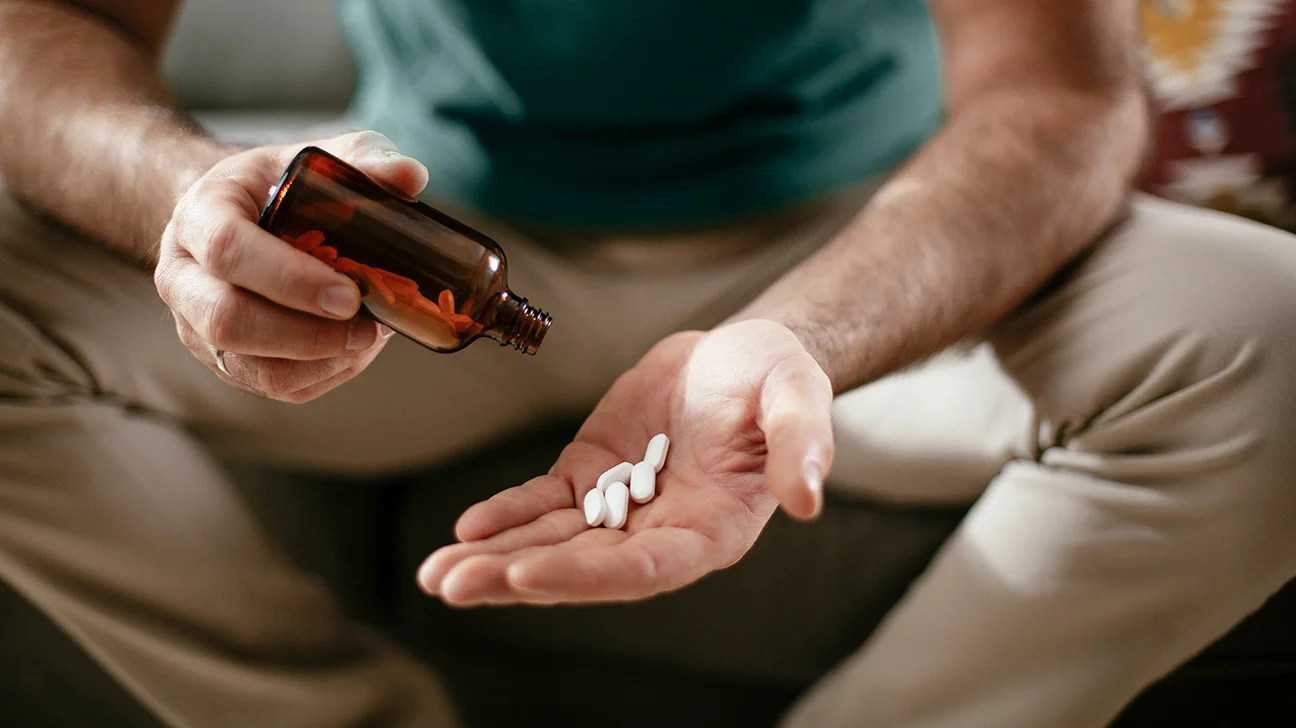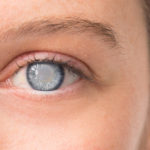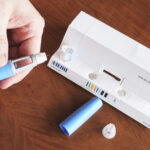What drugs cause impotence?
But what drugs cause impotence or are your medications responsible for Erectile Dysfunction?
Here Are the Top 10 Offenders.
Erectile dysfunction (ED) can be triggered by a wide array of medications, with more than 100 different drugs known to potentially contribute to this condition.
Among the most notorious culprits affecting sexual function are antidepressants, beta blockers, diuretics, and 5-alpha-reductase inhibitors (5-ARIs).
Antidepressants, while crucial for managing mood disorders, can often lead to sexual side effects, including ED. Similarly, beta blockers and diuretics, commonly prescribed for heart conditions and hypertension, may interfere with normal erectile function.
5-ARIs, used to treat conditions like benign prostatic hyperplasia (BPH), can also impact sexual performance.
If you suspect that your medication is causing erectile problems, it’s essential to discuss this concern with your healthcare provider promptly. In many cases, adjusting the dosage, switching to an alternative medication, or exploring other treatment options can help resolve ED and restore sexual health.
Taking proactive steps with your healthcare provider can often alleviate these issues and improve overall quality of life.
If you’re experiencing difficulty achieving firm and reliable erections, it’s crucial to consider the impact of your medications. Research suggests that for every 1 in 4 individuals with erectile dysfunction (ED), medication use may be a contributing factor.
Curious about whether your medication might be the cause of your ED? You’ve come to the right place. Read on to discover more about which medications are known to potentially cause ED, those that don’t, and what steps you can take if you’re encountering issues.
Identifying the Top 10 Medications Linked to ED
According to the National Institutes of Health (NIH), there’s a broad spectrum of over 100 medications that could potentially lead to erection problems. So, which ones are most likely to pose a challenge?
This question isn’t straightforward to answer because distinguishing between ED caused by medication and that stemming from underlying health conditions can be complex.
Moreover, studying all these medications comprehensively presents challenges due to their diverse effects and interactions.
In recent research, investigators delved into a decade’s worth of FDA reports detailing adverse medication reactions to pinpoint those most frequently associated with ED.
Their findings identified the following 10 medications as the most likely culprits for causing difficulty in achieving and maintaining erections:
- Finasteride (Propecia, Proscar) – Used for treating hair loss and enlarged prostate.
- Dutasteride (Avodart) – Also used for managing symptoms of enlarged prostate.
- Amlodipine (Norvasc, Katerzia) – A common medication for high blood pressure and chest pain (angina).
- Paliperidone (Invega) – Prescribed for schizophrenia and related psychotic disorders.
- Citalopram (Celexa) – An antidepressant belonging to the selective serotonin reuptake inhibitor (SSRI) class.
- Sertraline (Zoloft) – Another SSRI antidepressant.
- Isotretinoin (Absorica, Claravis, Zenatane) – Used primarily for severe acne treatment.
- Escitalopram (Lexapro) – An SSRI antidepressant often prescribed for anxiety and depression.
- Quetiapine (Seroquel) – Primarily prescribed for bipolar disorder and schizophrenia.
- Simvastatin (Zocor) – A cholesterol-lowering medication.
If you’re using any of these medications and experiencing ED, discussing your concerns with a healthcare provider is crucial.
They can help determine whether the medication is indeed contributing to your symptoms and explore potential alternatives or adjustments in treatment to mitigate these effects. Taking proactive steps can significantly improve your sexual health and overall well-being.
Of note, two of the medications on this list (amlodipine and simvastatin) are not typically associated with ED. Researchers are uncertain why this discrepancy exists, speculating that other health conditions or concurrent medications might be complicating factors.
Exploring 8 Types of Medications Known to Cause ED
Beyond the top 10 medications identified earlier, numerous categories of drugs have been linked to causing or exacerbating erectile dysfunction (ED). Among these, two primary groups stand out as major offenders:
- Prostate and Hair-Loss Medications: 5-alpha-reductase inhibitors (5-ARIs) These medications are commonly used to treat benign prostatic hyperplasia (BPH) and male-pattern hair loss by reducing dihydrotestosterone (DHT) activity. While effective for these conditions, they can also lead to ED and other sexual issues. Examples include:
- Finasteride (Propecia, Proscar)
- Dutasteride (Avodart)
- Antidepressants and Other Psychiatric Medications Depression itself can contribute to low sex drive and ED, but many antidepressants and other psychiatric drugs can directly cause or worsen these conditions. This group includes:
- SSRIs (Selective Serotonin Reuptake Inhibitors): Such as citalopram (Celexa), escitalopram (Lexapro), fluoxetine (Prozac), paroxetine (Paxil), sertraline (Zoloft)
- SNRIs (Serotonin-Norepinephrine Reuptake Inhibitors): Including venlafaxine (Effexor), desvenlafaxine (Pristiq), duloxetine (Cymbalta)
- MAOIs (Monoamine Oxidase Inhibitors): Like isocarboxazid (Marplan), phenelzine (Nardil), tranylcypromine (Parnate)
- Tricyclic Antidepressants: Such as amitriptyline (Elavil), nortriptyline (Pamelor), clomipramine (Anafranil)
- Benzodiazepines: Including diazepam (Valium), lorazepam (Ativan), oxazepam (Serax)
- Antipsychotics: Such as paliperidone (Invega), risperidone (Risperdal), haloperidol (Haldol)
The mechanisms through which psychiatric medications contribute to ED vary. Some may affect blood flow to the penis, making erections more difficult to achieve. Others alter brain chemistry, reducing sexual interest or physical responsiveness.
Understanding the potential impact of these medications on sexual health is essential for individuals experiencing ED.
Consulting with a healthcare provider can provide insights into whether medication adjustments, alternative treatments, or lifestyle changes could help alleviate these issues and improve overall sexual well-being.
- Antihistamines
Antihistamines are widely used to manage seasonal allergies and other allergic conditions by blocking the action of histamine, a chemical involved in allergic reactions. However, they can also interfere with healthy erections.
Common antihistamines known to potentially cause ED include:
- Diphenhydramine (Benadryl)
- Dimenhydrinate (Dramamine)
- Hydroxyzine
- Blood Pressure Medications and Diuretics
Medications used to treat high blood pressure and fluid retention (diuretics) can affect erectile function, primarily by reducing blood flow to the penis.
Types of blood pressure medications and diuretics that commonly cause ED include:
- Thiazide Diuretics: Such as chlorothiazide, chlorthalidone, hydrochlorothiazide
- Beta Blockers: Including metoprolol (Lopressor), atenolol (Tenormin), propranolol (Inderal)
- Loop Diuretics: Such as furosemide, bumetanide
- Other Medications: Like spironolactone, clonidine, methyldopa
While some high blood pressure medications may have minimal impact on erectile function or even be beneficial, others can exacerbate ED symptoms.
- Acid Reflux Medications
Certain acid reflux medications, particularly H2 blockers, can also influence histamine levels in the body, potentially leading to erectile dysfunction.
Examples of acid reflux medications that may affect ED include:
- Cimetidine (Tagamet)
- Ranitidine (Zantac)
- Nizatidine (Axid)
- Opioid Pain Medications
Long-term use of opioid pain medications is associated with various hormonal changes, including reduced testosterone levels, which can contribute to ED.
Commonly prescribed opioid medications known to potentially cause ED include:
- Hydrocodone
- Oxycodone
- Morphine
Understanding the potential impact of these medications on erectile function is crucial for individuals experiencing ED. Consulting with a healthcare provider can help navigate treatment options, potential alternatives, and strategies to manage both the underlying condition and associated ED symptoms effectively.
- Parkinson’s Medications
Parkinson’s disease itself can impact sexual health, including the ability to maintain firm erections. Additionally, medications used to manage Parkinson’s symptoms can contribute to erectile dysfunction.
Examples of Parkinson’s medications known to potentially cause ED include:
- Benztropine (Cogentin)
- Bromocriptine (Parlodel)
- Levodopa (Sinemet)
- Trihexyphenidyl (Artane)
Managing Parkinson’s disease involves balancing symptom relief with potential side effects, including those affecting sexual function.
- Hormone Therapy
Hormone therapy is a common treatment for prostate cancer, aimed at reducing testosterone levels or blocking its effects to slow cancer growth. However, these actions can lead to various side effects, including erectile dysfunction (ED).
Types of hormone therapy medications associated with ED include:
- LHRH Agonists: Such as goserelin (Zoladex) and leuprolide (Lupron)
- LHRH Antagonists: Like degarelix (Firmagon) and relugolix (Orgovyx)
- Antiandrogens: Including flutamide (Eulexin), bicalutamide (Casodex), and nilutamide (Nilandron)
These medications play a crucial role in prostate cancer management but may require additional strategies to address associated sexual health issues.
Medications Less Likely to Cause Erectile Dysfunction
Fortunately, not all medications are equally likely to cause erectile dysfunction. In some cases, certain medications may even help improve erectile function, particularly in individuals with high blood pressure.
Types of blood pressure medications less likely to cause ED and potentially beneficial for erections include:
- Alpha Blockers: Such as doxazosin, prazosin, and terazosin
- ACE Inhibitors: Like lisinopril, benazepril, enalapril, ramipril, quinapril, and ramipril
- ARBs (Angiotensin II Receptor Blockers): Including losartan, irbesartan, and valsartan
- Calcium Channel Blockers: Such as amlodipine, diltiazem, verapamil, and nifedipine
These medications not only help manage blood pressure but may also support erectile function, making them favorable choices for individuals needing treatment for hypertension without exacerbating ED symptoms.
Statins
Contrary to common belief, statins, which are medications used to lower cholesterol levels, such as atorvastatin (Lipitor), simvastatin (Zocor), and rosuvastatin (Crestor), typically do not cause erectile dysfunction (ED).
In fact, some men who take statins for high cholesterol have reported a 25% improvement in erectile function. Moreover, statins contribute positively to heart and brain health, making them beneficial overall.
Some Antidepressants
While many antidepressants carry a risk of causing ED, there are certain types that are less likely to affect sexual function negatively. Here are some antidepressants considered safer options for avoiding ED:
- Bupropion (Zyban)
- Mirtazapine (Remeron)
- Selegiline patches (Emsam)
- Vortioxetine (Trintellix)
- Vilazodone (Viibryd)
- Nefazodone (Serzone)
It’s crucial to note that any changes in antidepressant dosage or medication should only be made under the guidance and supervision of a healthcare provider.
Reversing ED Caused by Medications
In many cases, ED caused by medication can be reversed. Once the medication is discontinued, most individuals typically regain their usual erectile function. If you suspect that your medication is causing erection problems, it’s essential to discuss this with your healthcare provider.
They can assist in adjusting your dosage, switching to a different medication, or exploring other strategies to manage ED effectively.
Other Common Causes of ED
While medications are a significant contributor to ED, they are not the sole cause. Other factors that can lead to erectile dysfunction include:
Physical Conditions: Such as heart disease, diabetes, hormonal disorders (e.g., low testosterone), nerve disorders, pelvic trauma or surgery, and less common conditions like scleroderma and Peyronie’s disease.
Emotional Causes: Including stress, relationship difficulties, depression, anxiety, and performance-related worries.
Substances: Certain substances like alcohol, nicotine, marijuana, cocaine, heroin, methadone, amphetamines, and barbiturates can affect erectile function.
While some substances may initially increase confidence and sex drive, they can also make it harder to achieve and maintain a satisfactory erection.
Addressing ED comprehensively involves understanding and managing both medication-related factors and other potential underlying causes, ensuring a holistic approach to sexual health and well-being.
Benefits of Eating Strawberries
Benefits of Eating Pomegranate

A graduate of Computer Science and Information Management Technology. Diploma – Caregiving, Certificates – Dementia and Diabetes Awareness and Management. A researcher, blogger, songwriter, singer and acoustic guitarist. Born in an environment where natural talents such as healing are imparted at our natural birth. This natural talents of healing is the result of our genetic inheritance and the training from family environment.










